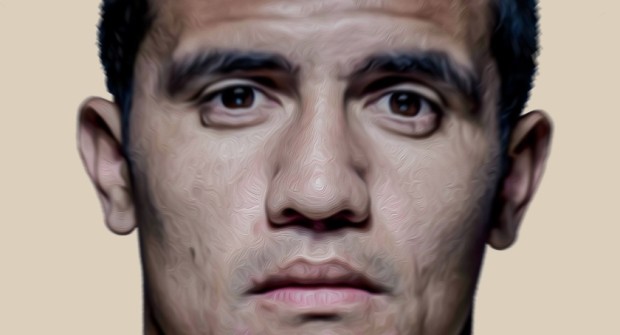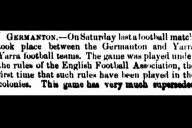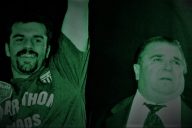In case you haven’t noticed, Tim Cahill has become the-I’ve-been-everywhere-and-done-everything-man. With the squabbling in the Liberal Party unresolved, given the prospect, the juggernaut that is ‘Timmy’ Cahill would sail into the Lodge overnight. With the reintroduction of knights and dames, a royal status for a man of many royalties is only a matter of time.
Not unlike a politician, he has maintained endless appearances on various TV shows. There is punditry, football academies, random VIP events – even one with him cuddling Liberal heavyweights. Add to that his penchant for engaging social media and you have an Australian sporting icon. It seems as though his whole playing career has been one long presidential campaign. As with his playing career, he’s all positioning, timing and execution. We’ve met his wife; we know his kids, his fashion, and his cars. What he may lack in the lexicon department he compensates with salesman-like fervour.
2030? 2040? Such is his presence and popularity it would come as no surprise if Tim Cahill becomes President Tim Cahill, the first president of the Republic of Australia. Surely, it is a matter of when not if.
In surpassing those who came before him – a la Harry Kewell (remember him?), Tim Cahill has become the quintessential rent-a-footballer celebrity, poster boy, an all-round guru and nice guy. Every woman and man knows who Timmy Cahill is. Every aspiring player wants his name. More than just a celebrity, he has become an (albeit self-proclaimed) “ambassador” – not just for King and Country but the beautiful game. Having conquered Europe and North America, he has his sights on Asia, which by the way now includes Australia. Should his illustrious career continue for much longer, the universe beckons.
But wait, there’s more. Add to that list a swathe of long-standing sales gigs: a fashion label, his puffing of corporate brands – breakfast cereals, sporting apparel, telecommunications networks, video games, watches; not to mention his charitable work with UNICEF. He possibly could be Australia’s biggest export at present. There is nothing he can’t (or won’t) do.
Naturally, Cahill’s local airtime peaked in the lead up to, and during, Australia’s (successful) hosting of the Asian Cup in January. As the incumbent superstar of the Socceroos, he has become the nation’s oracle.
After his heroics in the ‘Green and Gold’, which helped Australia to their first worthy-of-writing-home-about silverware, he again confirmed he was the main man. In truth, it was hard to look for worthy contenders after his scissor goal against China, in particular. We did although see enough in Massimo Luongo to ask: “please sir, can we have some more?”
Not long after the Socceroos brushed off the confetti of the Asian Cup triumph, Cahill announced his latest ‘project’ would be in Shanghai for a reported $10 million deal with Shanghai Greenland Shenhua in the Chinese Super League.
Prior to that, he had spent two-and-a-half-years in New York with the (corporate-themed) Red Bulls, a deal for which he was earning in excess of $3 million per season. As a free-agent following his Red Bulls stint, he was entitled to a handsome sign-on fee, no matter where he went. Before that of course, his career was forged in England, first with Milwall and later, his Merseyside conquering stint at Everton. Suffice to say, he’s done very well for himself.
But rather than grinding to a natural and inevitable demise, Cahill’s career is doing anything but. This is indicated both in his on-field performances – in particular with the national team – as well as his ability to acquire hefty contracts and stay in the spotlight. At 35, with his career flourishing, it seems as though he is only getting younger. Rather than growing grey and slow, his looks are getting more charming and his performances more inspiring. How is this possible?
Not a week goes by that Timmy doesn’t feature in the news nor does he not fulfil some sort of promotional opportunity. The presidential campaign bus goes on and on. After the Asian Cup final, he donated his Socceroo shirt (signed by his teammates) to boy-band singer Niall Horan of the aptly named One Direction. Just the other day he was in suburban Chadstone plugging his latest apparel sponsor. Hold the playing eulogies, he’s got every base covered.
But one of his more recent, and certainly the most bizarre media appearance, was a phone-in from New York on the John Laws Morning Show on Sydney’s 2SM.
While it may have shocked some people to find out that ‘Golden Tonsils’ still had a job (in radio!), Laws again reinforced to us that he was a creature from another era, ignorant and blinkered yet still with a hardcore, if ever-declining listenership in Sydney’s Jurassic Park.
First, there was John Laws doing his thing. That much we could expect. Being a shock-jock he was asking the pertinent questions. But the way he was asking and the hint of contempt made it somewhat distasteful – particularly to soccer fans. He was clearly not convinced of Australia’s success and, more so, their presence in Asia. With all due respect to Tim Cahill, he, contrary to Laws’ generosity, was not the ‘best player in the world’. Laws, obviously out of his depth on round ball-101 and no doubt more familiar with less rotund codes, relied on media reports and thinly veiled barbs at Cahill’s alleged affluence. Or was this part of Laws’ agenda? Maybe it was the ‘Tim Cahill Effect’? Tim Cahill was having none of it, and promptly hung up. With good reason, we all took Cahill’s side. How dare John Laws pick on our Timmy?
Young Lee, from Byron Bay, was so outraged with the “country’s undisputed King of Talkback Radio” he called in to make his displeasure known (and caused a spike in palpitations in retirement homes across NSW) by describing Golden Tonsils as “a cock-sucking cunt.”
But amidst all the hoo-ha, had we overlooked something? It took John Laws of all people to ask a footballer some difficult questions! Regardless of his intent, unlike the mainstream Australian sports (and in this case, football) media, he didn’t go for the usual backslapping shtick. Too often athletes get a free ride; their puff interviews becoming a mutual exchange – the media outlet gets a scoop or shot of a star, while the athlete uses it to promote an image or brand. The audience and fans are treated like passive consumers. Like politicians, athletes use these grabs to raise their profile and build their stock within the naïve electorate. And, like politicians or other public figures, while we hold them on a pedestal, why shouldn’t we hold them to a higher account? Or at lease ask them questions minus the sugar-coating? Laws may have been provocative bordering on rude, but it’s hardly a hanging crime. Tim Cahill is a big name – surely he can take it.
No doubt, Tim Cahill is an Australian legend – a football legend. For his achievements since the 2006 World Cup in Germany he will rightly feature on the long and quintessential highlights reel of Aussie sporting greats. He has contributed immensely to football’s newfound social currency in this country. But with each appearance and audio grab, Tim Cahill becomes more corporate entity than legendary footballer. We’ve seen it before with the Golden Generation. The closer they get to the wall, the more they choose to milk the goodwill that has been created in their name. In this regard, Cahill is king.
Like many of the Aussie sporting greats, Timmy’s biggest success has been off the field, in the public domain. That is, his prowess to cash in on his talents and popularity during a period of growing football popularity has been stupendous. As a football player, his ability to create a ‘brand’ is second to none in this country. Likewise, he has truly become a global brand. His PR has been so profound that he is now widely lauded as Australia’s greatest footballing talent. For every success, his management representatives (SFX Sports, owned by one of the biggest sports management firms, the Wasserman Media Group) have played a massive part.
With his performances at the 2014 World Cup in Brazil (particularly his goal against the Dutch), he made sure that it was difficult to forget him in a hurry and with his role in winning the Asian Cup in Australia, the names ‘Kewell’ and ‘Viduka’ or even ‘Warren’, ‘Marston’ and co. have for the moment become obsolete. We’ve seen examples of this before in Australia with international players like Alessandro Del Piero, but Cahill is our own homemade football celebrity.
Sadly, this constant media attention and media-driven hype, this focus on individual athletes – as in the whole sport industry – takes the attention away from the game itself. It becomes a narrative of the characters, the personalities, the products, and the actors via which we are supposed to engage in the game with.
Tim Cahill, like those before him, often makes feel-good remarks of ‘giving back’, the ‘grassroots’ etc. The words have become clichéd buzzwords for every athlete looking to build goodwill and prolong their time in the sun. So far, we are yet to understand exactly what those terms mean or what his contribution entails. Is Tim Cahill a philanthropist? No one has bothered to ask. Maybe he gives a portion of his earnings to fund programs for those in need? We aren’t to know.
Judging by what we heard from the Laws interview, Cahill apparently does not like to talk about money – an admirable stand. But it hasn’t always been like that. Cahill has openly flaunted his wealth, his earnings and his lifestyle in previous interviews and media ops. It seemed as if there was something in the Shanghai deal that was uncomfortable. Perhaps it was the magnitude of the deal that was contrary to his ethos. Maybe he was conscious of local fans’ ire for choosing Chinese money over their beloved A-League. Besides, who are we to begrudge him of however the market values his ability? No one expected him to play for free and in a ‘free-market’, he is free to take any offer he chooses.
Despite his status, Timmy Cahill is human after all. While he may claim to exude civic virtues, he is no Cincinnatus. Tim Cahill’s prominence is a perfect case study in the contemporary and symbiotic relationship between the dominant commerce of our time – sports, media and business.
True to form, his latest venture is a memoir to be published by HarperCollins, later this year. Given how much we know about him, it’s hard to imagine what could be in there that will be news to us. Announcing it via social media, Cahill made it clear that rather than being the final chapter, this was just the beginning.
In other words, the second half of the 20th Century was the era of Captain Socceroo, Johnny Warren, the first half of the 21st century will be the era of President Socceroo, Tim Cahill.
















